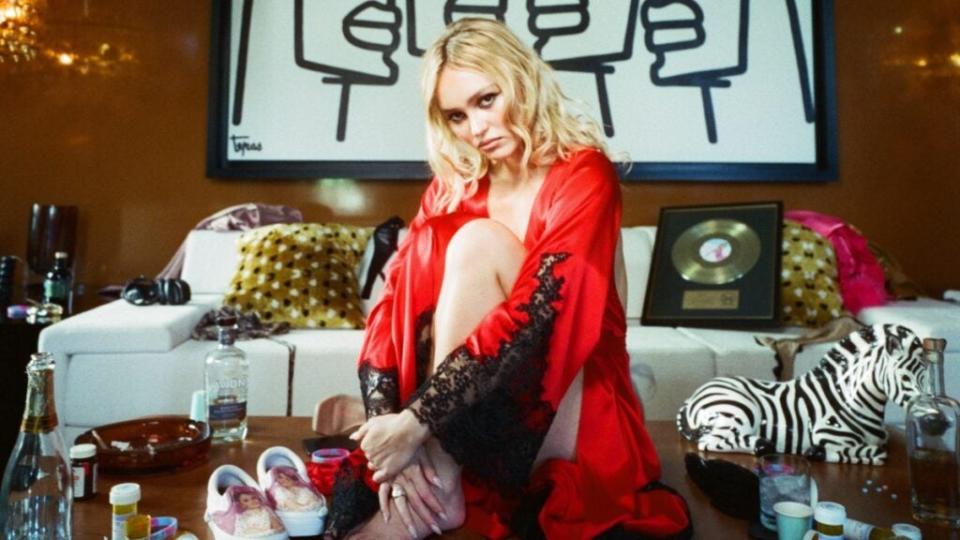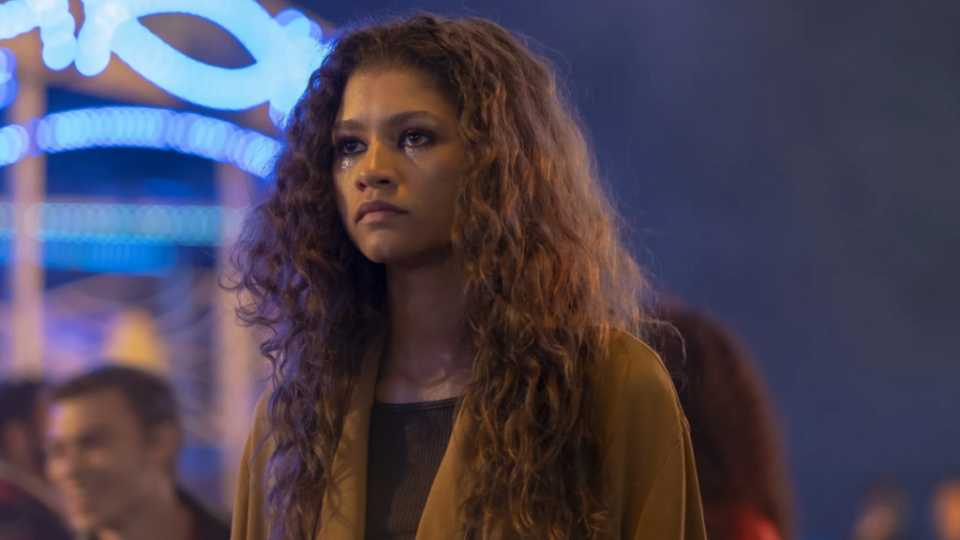‘The Idol’ Canceled: Inside the Quick, Messy Death of HBO’s Controversial Drama | Analysis
- Oops!Something went wrong.Please try again later.
- Oops!Something went wrong.Please try again later.
- Oops!Something went wrong.Please try again later.
From the first screening of “The Idol” at the Cannes Film Festival in May, the warning signs appeared. Instead of the usually effusive ovation from the black-tie audience at the Palais des Festivals, tepid applause and awkward side-eye greeted the first two episodes of the HBO drama series, as Warner Bros. Discovery unveiled its rebranded streaming service Max in the U.S.
Social media was quick to weigh in with a less subtle verdict about Lily-Rose Depp in barely-there outfits as pop music star Jocelyn in the sexual thrall of Tedros, played by Abel “The Weeknd” Tesfaye. The graphic scenes included not just a writhing Depp in front of a camera demanding her sexual freedom, but Tesfaye choking Depp during sex.
“A Pornhub-homepage odyssey starring Lily-Rose Depp’s areolas and The Weeknd’s greasy rat tail,” wrote New York Times’ reporter Kyle Buchanan on X. “Love that this will help launch the HBO Max rebrand, should slot nicely next to House Hunters!”
“The Idol,” or 50 SHADES OF TESFAYE: A Pornhub-homepage odyssey starring Lily Rose Depp’s areolas and The Weeknd’s greasy rat tail. Love that this will help launch the HBO Max rebrand, should slot nicely next to House Hunters!
— Kyle Buchanan (@kylebuchanan) May 22, 2023
Things didn’t improve from there. And on Monday, HBO — home of such revered series as “Succession” and “The Sopranos” but also Sam Levinson’s last hit, “Euphoria” — bowed to reality and canceled the show.
“‘The Idol’ was one of HBO’s most provocative original programs, and we’re pleased by the strong audience response,” said the network in a strained statement. “After much thought and consideration, HBO as well as the creators and producers have decided not to move forward with a second season. We’re grateful to the creators, cast and crew for their incredible work.”
That the premium cabler continued to cling to the show’s artistic value spoke volumes about the network’s embarrassment at the cultural black eye it had just inflicted on itself. And to how far on a limb it had gone to promote the show and to cater to its star Tesfaye, including the dumping of director Amy Seimetz’s vision that was apparently considered too feminist, along with multiple completed episodes.
Because (Jocelyn) lacks self-awareness and self-understanding, I think it was doomed from the beginning.”
Joi Carr, English professor at Pepperdine University
“I think it’s really simple what happened,” one individual close to production told TheWrap. “One powerful person decided he wanted to make a different show and everyone said yes. Ultimately it was about corporate people not wanting to stand up — and just saying, ‘Yes, we’ll do whatever you want.’”
One cultural critic said the audience rejected an old-fashioned trope: the objectified heroine as sexy window-dressing.
“Because ‘The Idol’ has a female at the center of the story, and because she lacks self-awareness and self-understanding, I think it was kind of doomed from the beginning,” said Joi Carr, professor of English and film studies at Pepperdine University. “21st century women, especially consumers, and even men, now, want women that have more clarity about who they are even if they’re evil.”
She added: “She [Jocelyn] didn’t have a voice and subjectivity that drove the narrative with her agency, so she was really just dressing in art — flat fetish — and I just don’t think there’s an audience for that right now.”

How did HBO get here?
Trouble surrounded “The Idol” long before its Cannes debut. The series was first announced in November 2021, with “The Girlfriend Experience” director Seimetz attached for all six episodes. A knowledgeable individual told TheWrap that the series co-created by Levinson, Tesfaye and Reza Fahim read in script form as a surreal, “David Lynchian” depiction of Los Angeles and the music industry.
Seimetz exited the show by April 2022, as Levinson stepped in to direct following HBO’s announcement that the project would undergo a major creative overhaul involving significant reshoots and adjusting cast and crew accordingly. The tone went from David Lynch to more “Entourage.”
What lay behind that unusual decision was the network’s hope to mirror the success of “Euphoria” with an edgy, Levinson-produced series, while also building a relationship with Tesfaye, an executive producer on the series as well as a leading member of the ensemble. To make the budget work after dumping the completed episodes, the singer offered his real-life home as the primary filming location, an executive close to the production told TheWrap.
Rolling Stone then upped the “Idol” ante in March 2023, with an explosive report chronicling how the show had been plagued by production delays, costly reshoots, last-minute script rewrites and a “sense of chaos” on set. Tesfaye made fun of the “ridiculous” report, mocking the accusations on social media and sharing footage from the show that didn’t make it to air where Tedros criticized the magazine.
.@RollingStone did we upset you? pic.twitter.com/Uyx06lyRgx
— Abel Tesfaye (@theweeknd) March 1, 2023
Throughout this barrage of criticism, the network and people involved with production who spoke with TheWrap seemed dazzled by the vision of the “Euphoria” creator, who’d previously found success centering drugs, sex and scandal in a series aimed at younger viewers.
First released in 2019, “Euphoria” offered an edgy, raw look at addiction and high school life from the perspective of recovering teenager Rue, a role played by Zendaya that catapulted her career, winning her two Emmys for the role.
The show brought record-breaking viewership for the network, according to HBO, with Season 2 averaging 16.3 million viewers, the best performance for any season of an HBO series over the past 18 years other than “Game of Thrones.”

Then ‘The Idol’ came out…
The controversy around “Euphoria” helped boost interest in “The Idol,” with the show debuting to 913,000 viewers for its June 4 evening premiere across Max and linear HBO telecasts, on par with the premiere viewership for “Euphoria” and “The White Lotus,” according to Nielsen and first-party data.
But shock value couldn’t keep viewers’ attention, as the series saw a 12.4% dip in audience to 800,000 across Max and HBO linear telecasts for Episode 2. The network didn’t report viewership for the drama’s remaining three episodes.
Meanwhile, cultural critics continued to pound the show, especially as episodes depicted Jocelyn choking herself while masturbating and Tedros using an electric prod on her friends.
“It’s not just that it’s a male fantasy, but it’s hostile to feminism,” “Brainwashed: Sex-Camera-Power” director Nina Menkes told TheWrap in June. “They’re pretending that Jocelyn is the protagonist, but they totally disempower her. She’s sexualized as an object in every single shot. And the whole first episode ends with [Tedros] mansplain[ing] about singing, about sex, about everything.”
But others just excoriated the show as boring.
LOL. How did The Idol make it to the airwaves? It’s comically bad. Ejaculatory and vapid. They clearly think it’s subversive but it isn’t! It’s boring! Lily Rose Depp is interesting and it’s a shame she wasn’t given better material.
— roxane gay (@rgay) June 5, 2023
Critic Roxane Gay posted: “LOL. How did ‘The Idol’ make it to the airwaves? It’s comically bad. Ejaculatory and vapid. They clearly think it’s subversive but it isn’t! It’s boring! Lily-Rose Depp is interesting and it’s a shame she wasn’t given better material.”
One of the insiders who spoke to TheWrap agreed: “It was offensive. And its biggest offense was being boring.”
The cancellation
“The Idol” aired its Season 1 finale on July 2 to little fanfare. An individual close to decision-making at the network told TheWrap Monday that the show’s creators and executive producers had left options open to continue “The Idol” with a potential second season, but didn’t have a specific plan for a multi-season series from the start.
Critics of the show of all different political stripes were thrilled. “We are glad HBO heeded our calls to cancel The Idol, toxic sexually explicit fare targeted to teens,” the conservative Parents Television and Media Council said in a statement on Tuesday. “The program’s extreme and disturbing content – nudity, sexual abuse, torture – can be harmful to young viewers.”
Observed Carr in her interview with TheWrap: “Even some of the shows that have the sexualized female — there’s always other women who may be sexualized but they seem to be more complex and they’re on a journey towards something and not necessarily just being used [and] pimped out in some way toward commodification and consumption.”
When the dust finally settled, there wasn’t much enthusiasm for more. “The Idol” leaves behind five subpar episodes and a stain on the reputations of HBO, Levinson and Tesfaye.
“How did this happen? I don’t know,” the individual with knowledge told TheWrap. “Someone will be writing a book about this one day.”
Loree Seitz contributed to this story.
The post ‘The Idol’ Canceled: Inside the Quick, Messy Death of HBO’s Controversial Drama | Analysis appeared first on TheWrap.

